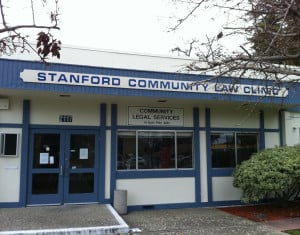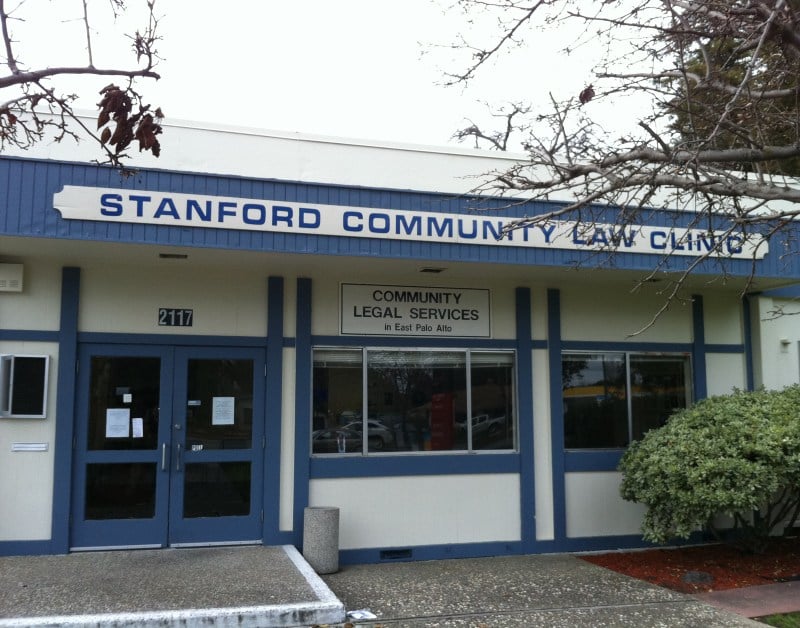
A modern office space is now open to clients seeking free legal services at the Community Law Clinic (CLC) in East Palo Alto, one of the eleven clinics offered by the Stanford Law School that offers a hands-on learning experience for aspiring lawyers while giving back to the community.
The law school allotted $100,000 to complete the “long-overdue but very successful facelift for the space,” according to Juliet Brodie, law professor and the clinic’s director.
The CLC is one of only a handful of organizations that provide free legal representation to individuals from low-income households in the East Palo Alto community, Brodie said.
“All across America, there’s a crisis with the lack of attorneys for poor people in some of the most important areas in their life, like housing, wages and income,” she said. “There just aren’t enough lawyers, so we hope to be a tiny part of the solution.”
“We become their lawyers and help them in the way that lawyers do,” she added.
A clinic’s history
The CLC opened in its current form in 2003; however, a previous iteration of the clinic, named the East Palo Alto Community Law Project, had been located on the same site on University Avenue for many years prior.
According to Brodie, the reopening in 2003 came as a result of the Law School’s rededication to a dual mission: to provide legal representation to low-income people in the surrounding area, and to give law students the opportunity to act as real lawyers.
She added that the reopening in 2003 was part of a dramatic growth in the law school clinical education program in general.
“Before 2003, the clinic was just one of a small handful of stand-alone experiential learning opportunities for students,” Brodie said. “In the past ten years, the law school has made one of its principal initiatives to build a sizable and strategic clinic.”
Brodie began working at the clinic in 2006 after having spent the previous 10 years working in similar community-based programs at two other law schools. At the CLC, Brodie supervises the law students with three other clinical supervising attorneys: Danielle Jones, Lisa Douglass and Larisa Bowman.
For Brodie, one of the most successful parts of the clinic is its ability to adapt the practice to the needs of the community.
“We can’t do everything people suggest, but we can keep our ear to the ground and try to understand what’s needed,” she said. “I see for the future of this clinic continuing that process of engaging with the community to see how we can be most useful.”
Student lawyers
After submitting her application last year, Nisha Kashyap J.D. ’14 began working at the clinic this quarter.
Law students can apply to be a part of one of the eleven clinics offered through the law school, Kashyap said. If accepted, these students spend the quarter working full-time for the clinic, receiving academic credit for their work and refraining from enrollment in any other classes. Brodie compared this kind of program to a residency, in which the student is completely involved with the process.
“[At the CLC], students become the actual lawyer on record for low-income people in a bunch of different cases,” Brodie said. “They work cases related to eviction defense work, social security hearings, wage disputes and helping people with criminal record expungement.”
According to Brodie, the law students — under the supervision of one of the four attorneys — are involved in every step of a case: They go to the court, interact with the judges, write up files and research their cases.
“The type of work I want to do is legal aid work and direct service work – working with clients – and I thought this might be a good way to practice that kind of work before graduating,” Kashyap said.
For Kashyap, the primary function of the CLC is to bring legal aid and services to a community that does not have many options, especially for free legal services.
“There’s a lot of need for this kind of work in East Palo Alto and in the Bay Area in general,” she said. “[The CLC] helps fill that gap with services.”
Kashyap added that the clinic was a great opportunity to get out of the classroom environment and practice the kinds of skills she’ll be using as a lawyer.
“Class is great, but the things I do in class are not the kinds of things I’ll be doing as a lawyer,” she said.
Casey Raymond J.D. ’14 has been working at the clinic for three quarters.
“What I loved about the program, and why I’ve stayed with it for so long is that it’s so hands-on,” Raymond said. “I think law school is academic, but it’s also a trade school, and I think it’s good to have done some litigation or been before a judge or done negotiations with clients or other lawyers before starting your legal practice.”
Maintaining a balance between classroom and clinic work can create a much more successful and rewarding law school experience, Raymond added.
“We help provide and protect the basic needs and rights of people in the community,” he said, mentioning that he is currently working on a class action suit that has been filed for a client who was working, but was not paid wages.
Kashyap is currently working on two cases. One focuses on expungement of a criminal record for a client with old criminal convictions from twenty years ago that he would like to have removed from his record.
“The other case involves a client who was disabled in a workplace environment five years ago and can no longer work,” she said. “I’m helping her apply for supplemental security income benefits, through the social security administration.”
For Kashyap, getting exposure to different kinds of law in the clinic is a great experience.
“The clinic gives you an opportunity to be exposed to more types of law, like expungement, wage and hour,” she said. “That’s how the clinic is shaped, to give you more exposure as to the types of options for law you could work with after school.”
Contact Josee Smith at jsmith11 ‘at’ stanford.edu.
